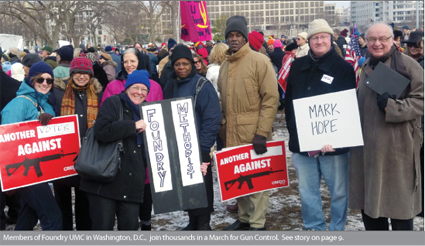
United Methodists speak out to end gun violence
By Melissa Lauber
UMConnection staff

Before a thousand people, who gathered Jan 26 to make their voices heard, the Rev. Dean Snyder bowed his head and invoked the presence of God in this nation’s debate on ending gun violence.
Snyder is senior pastor of Foundry UMC, one of three churches asked to cosponsor the March on Washington For Gun Control. The purpose of the event was to advocate for a ban on military assault weapons and high capacity magazines and call for comprehensive background checks.
“Just 30 days after our friend Molly Smith, the artistic director of Arena Stage and partner Suzanne Blue Star Boy, posted the idea of a march on Facebook, hundreds of people gathered at the Reflecting Pool,” Snyder wrote in an email about the event. They “marched silently to the Washington Monument to call for an end to easy access to weapons that we do not even allow people to use when they go deer hunting – the kind of weapons that have been used again and again to massacre children, college students and adults.”
Snyder said he was grateful that amidst all of the speeches, the organizers also wanted a time of prayer. “So we raised hands, palms extended, toward the White House and then the Capitol and prayed for the Holy Spirit to move in a powerful way in those places of power. And we prayed that the Holy Spirit move in each of our lives to make our world safer for children.”
According to Marian Wright Edelman of the Children’s Defense Fund, who spoke at the march, a child or young person is shot every 30 minutes in the United States.
This statistic is made all the more poignant in light of the Dec. 14 shooting, when 20 children and six adults were killed by a gunman inside Sandy Hook Elementary School in Newtown, Conn.
Members of the Newtown community attended and spoke at the march.
It was that incident that galvanized religious leaders from 40 faith traditions representing 80 million Americans to form the group Faiths United to Prevent Gun Violence.
That group gathered at the United Methodist Building in Washington on Jan. 15, to express their common desire to end gun violence and the senseless murder by firearms of 33 Americans each day,
According to the group’s coordinator, Vincent DeMarco, the faith leaders are seeking three legislative actions from the U.S. Congress: “Everyone who buys a gun should pass a criminal background check; high capacity weapons and ammunition magazines should not be available to civilians,and gun trafficking should be a federal crime.”
Evoking the horrors of mass killings in Newtown, Tucson, Fort Hood, Virginia Tech and Oak Creek, and the morally unacceptable 30,000 gun deaths each year in the U.S., the Rev. David Cooney called on United Methodists to adopt these relatively minimal actions to reduce gun violence. “What we are asking is not just good policy,” he said. “It is a moral imperative.”
While he was unable to attend the press conference at the Methodist Building, Bishop Marcus Matthews has been an active voice in urging all United Methodists to allow their lament over school children killed in Newtown to be transformed into a call for justice, healing and wholeness.
“The death of these children sent a tremor through the hearts of our communities. It ignited an urgent call for change that we cannot ignore,” Matthews said. “This isn’t about a false choice between the Second Amendment and gun control. It’s about soul searching, deciding what matters most and finding ways to keep guns out of the wrong hands. We have a moral obligation to try to make a difference.”
Matthews’ fellow religious leaders agreed with him.
In a prayer, Episcopal bishop, the Rt. Rev. Mariann Edgar Budde, confessed her regret that “it took the murder of 20 children to break our nation’s heart. But our hearts are broken now,” she said, promising God to keep on working to address moral and spiritual crises across the land.
For the Rev. Jim Wallis of the Sojourners community, the idea that “the only thing that stops a bad guy with a gun is a good guy with a gun,” which was presented by the National Rifle Association after the Sandy Hook shooting, is “at the heart of gun violence today.”
The problem, said Wallis, is that statement is “factually flawed, it is morally mistaken, theologically dangerous and religiously repugnant.”
“We must say we’re done sitting shocked on the sidelines,” said Rachel Laser, deputy director of the Religious Action Center of Reform Judaism. For those who have had enough pain, despair and injustice, Laser and the other religious leaders invited people of faith to contact their members of congress.
There are three messages that DeMarco is convinced the faith community needs to understand and proclaim: gun violence prevention is a moral issue; gun violence prevention laws work; and there is power when people of faith come together, power that can’t be ignored.
For more information, visit www.FaithsAgainstGunViolence.org. Shaun Lane contributed to this story.

Login/Register to leave comment